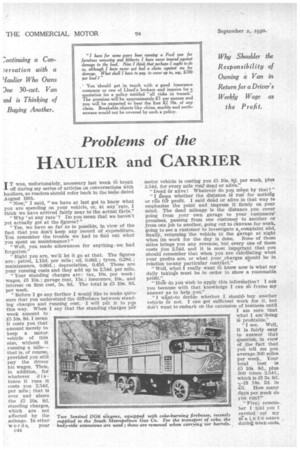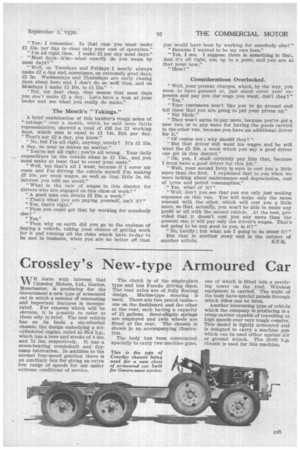Problems of the
Page 66

Page 67

If you've noticed an error in this article please click here to report it so we can fix it.
HAULIER and CARRIER
T was, unfortunately, necessary last week to break off during my series of articles on conversations With hauliers, so readers should refer back to the issue dated August 19th.
"Now," I said, "we have at last got to know what you are spending on your vehicle, or, at any rate, I think we have arrived fairly near to the actual facts." "Why 'at any rate '? Do you mean that we haven't yet actually got at the figures?"
"Yes, we have so far as is possible, in view of the fact that you don't keep any record of expenditure. You remember the trouble we had to find out what you spent on maintenance?"
"Well, you made allowances for anything, we had forgotten."
"Right, you are, we'll let it go at that. The figures are: petrol, 1.15d. per mile; oil, 0.06d. • tyres, 0.28d.; maintenance, 0.60d.; depreciation, 0.45d. Those are your running costs and they add up to 2.54d. per mile.
"Your standing charges are: tax, 10s. per week : wages, £3 10s. ; garage rent, 15s.; insurance, 10s., and interest on first cost, 5s. 8d. The total is £5 10s. 8d. per week.
words, your c44
motor vehicle is costing you £5 10s. 811. per week, plus 2.54d. for every mile run; dead or alive."
"Dead or alive ! Whatever do you mean by that?"
"I iilean whether the distance is run' for nothing or an faprofit. I said dead or alive in that way to
emphasize the point and impress it firmly on your mind. The dead mileage is the distance you cover going from your own garage to your customers' premises, passing from one customer to another or
from one job to another, going out to anvass for work, going to see a customer to investigate arcomplaint and,
finallSr, returning the vehicle to the garage at night when its work for the day, is done. None of those Miles brings you any revenue, but every one of them
costs you 2.54d. and it is most important that you should remember that when you are calculating what your profits are, or what your charges should be in relation tomny particular contract."''
"Well, what I really want tb know now is what my daily takings must be in order to show a reasonable profit."
"How do you wish to apply this infoniaation? I ask you because with that knowledge I can sb frame my answer as to help you."
"I wiint.to decide whether I should. buy another vehicle Or not. I can get sufficient work for it, but
don't want to embark on the extension of business until I am sure that what I aro'cloing Is profitable."
"I see. Well, It is fairly easy' to answer that question, in vieW of the fact that
you tell me you
average 300 miles per week. Your total Cost is £5 10s. 8d., plus 300 times 2.54d., which is £3 3s. 6d. £.8 14s. 2d. in all. How many days per week do you run?'"
"Five; remember I told you carried out my niaintenance during week-ends.
"Yes; I remember. In that case you must make £1 15s. per day to clear only your cost of operation."
"I'm all right then. I make £2 per day most days."
"Most days—h'm—what exactly do you mean by most days?"
"Well, on Tuesdays and Fridays I nearly always make 12 a day and, sometimes, on extremely good days, £2 5s. Wednesdays and Thursdays are early closing days about here and I don't do so well then, and on Mondays I make £1 10s. to £1 15s." •
"But, my dear chap, that means that most days you don't make £2 a day. Let's have a look at your books and see what you really do make."
The Month's "Takings."
A brief examination of this haulier's rough notes of " takings " over a month, which he said were fairly representative, showed a total of £36 for 21 working days, which sum is equal to 14s. aid. per day. " That's not £2 a day, you know."
"No, but I'm all right, anyway, surely? It's £1 15s. a day, as near as makes no matter."
"You're not all right ; you're all wrong. Your daily expenditure 'on the vehicle alone is £1 15s., and you must make at least that to cover your costs."
"Well, but that's all I want, because if I cover my costs and I'm driving the vehicle myself I'm making £3 10s. per week wages, as well as that little 5s. 8d. interest you told me about."
"What is the rate of wages in this district for drivers who are engaged on this class of work?" "A good man can obtain £3 10s. a week."
"That's what you are paying yourself, isn't it?" "Yes, that's right."
"Then you could get that by working for somebody else?"
yes.,,
"Then why on earth did you go to the expense of buying a vehicle, taking your chance of getting work for it and running all the risks which have to-day to be met in business, when you are no better off than you would have been by working for somebody else?" "Because I wanted to be my own boss."
"Yes, I see. I suppose there is something in that. And it's all right, too, up to a point, and you. are at that point now."
" How? "
Considerations Overlooked.
"Well, your present charges, which, by the way, you seem to have guessed at, just about cover your expenses and pay you the' wage you want, don't they?"
"Your customers won't like you to go around and tell them that you are going to put your prices up." "Not likely."
"They won't agree to pay more, because you've got a new van, or to pay more for having the goods carried in the other van, because you have an additional driver for it."
"Of course not ; why should they? ": "But that driver will want his wages and he will want the £.3 10s. a week which you say a good driver can get in this district."
"Oh, yes, I shall certainly pay him that, because I must have a good driver for this job."
"Well, your second lorry is sure to cost you a little more than the first. I explained that to you when we were talking about maintenance and depreciation, cost of tyres and petrol consumption."
"Yes, what of it?"
"Well, don't you see that you are only just making expenses on this van. You will make only the same amount with the other, which will cost you a little more, so that, actually, you won't be able to make any profit at all with the second vehicle. At the best, provided that it doesn't cost you any more than the present one, it will pay only the driver's wages. That's not going to be any good to you, is it?"
"No, hardly ; but what am I going to do about it?" But that is another story and is the subject of another article. S.T.R.












































































































